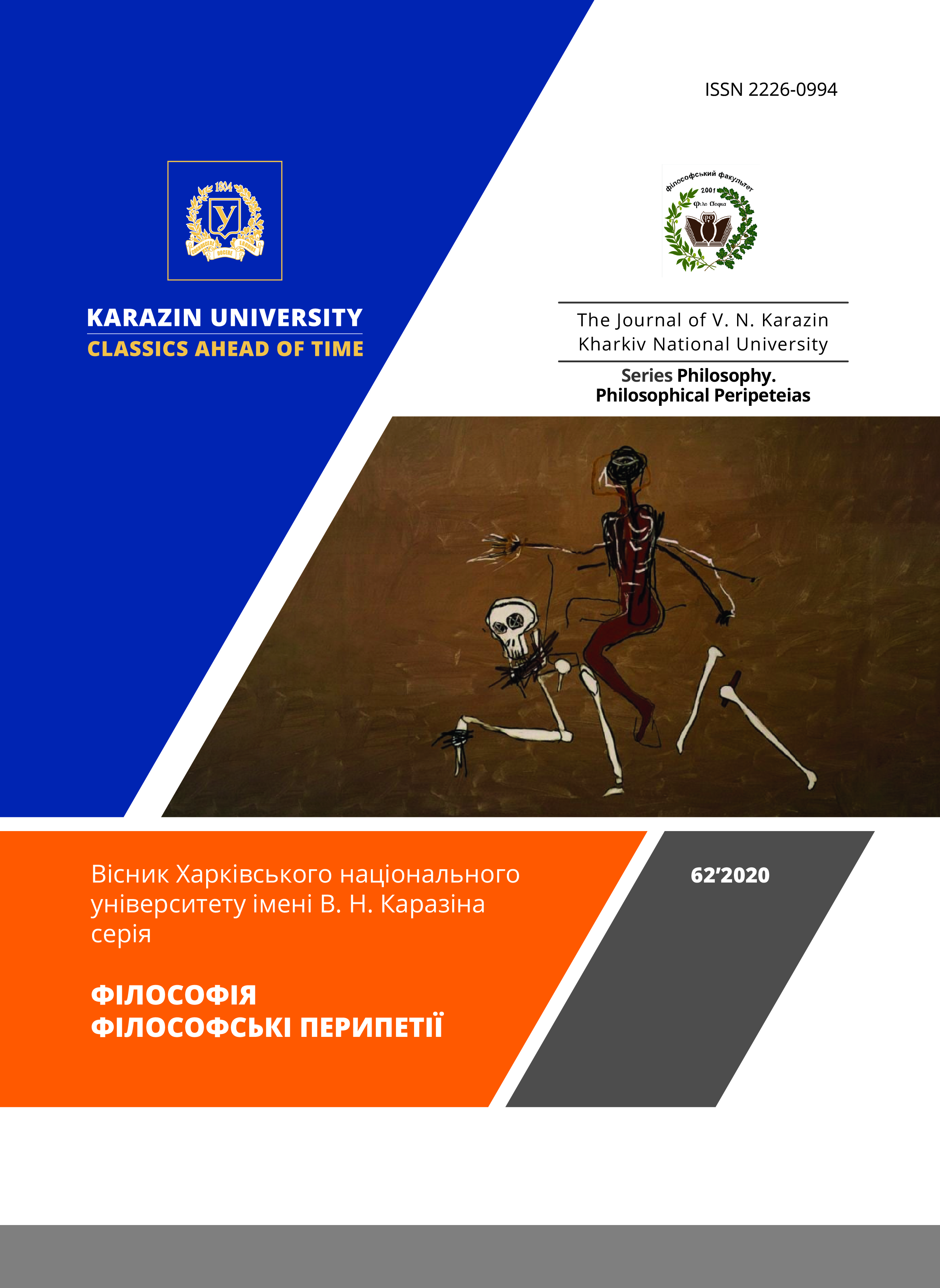УТРИЗМ «Я» Ю. МАМЛЄЄВА ЯК ОСОБЛИВИЙ ВИД МЕТАФІЗИКИ
Анотація
У статті розглядається питання відношення утризму «Я» Юрія Мамлєєва до Традиції. Проблемним стає протиріччя двох позицій, які Мамлєєв зазначає у різних місцях «Долі буття» – це погляд на утризм «Я» як на новий підхід у рамках Традиції та як на вихід за її межі з внесенням сторонніх елементів. Автор статті, спираючись на зв’язок утризму «Я» та «Останньої Доктрини», яка однозначно є принциповим виходом за межі Традиції, приходить до висновку, що утризм «Я» необхідно радше розглядати не як новий підхід у рамках Традиції, а як автономний по відношенню до неї конструкт. На думку автора, утризм «Я» через власну радикальність містить дві ключові проблеми, які призводять не лише до розриву з Традицією, але й до порушення внутрішньої цілісності самої філософії Мамлєєва. Ці дві проблеми визначаються як радикалізація формули Веданти «Атман = Брахман» і відсутність фігури Іншого. Утризм «Я» формує єдине Я, яке автор статті пропонує називати «Я-тотальне», оскільки воно витісняє класичне поняття Абсолюту та взагалі будь-що окрім себе. З цього випливає відсутність топосу для таких мамлєєвських концептів як «Безодня» та «Росія Вічна», що загострюється недопущенням метафізичної події Іншого, особливо важливої для ідеї метафізичної та таємничої Росії, яка потребує інтерсуб’єктивності. У процесі аналізу зазначених проблем і питань у статті проводиться порівняння філософських позицій Штірнера та Мамлєєва, а також звернення до теми демонічності утризму «Я». Урешті-решт автор доходить висновку – утризм «Я» потребує перегляду та пом’якшення, що дозволило б йому органічно існувати в загальній картині мамлєєвського світобачення та не втрачати зв’язок із Традицією попри неминучий вихід з неї.
Завантаження
Посилання
/Посилання
Berdyaev, N. (1991). Self-knowledge. An Essay in Philosophical Autobiography. Leningrad: Lenizdat. (Original work published 1940). (In Russian).
Guenon, R. (2004). Man and His Becoming According to the Vedanta. (N. Tiros, Trans.). Moscow: Belovod’ye. (Original work published 1925). (In Russian).
Mamalui, A. A. (2010). Ends without End, or the Situation of “Post(under)modernity”. In L. V. Starodubtseva (Ed.), What is Modernity? Philosophical Reflections on the Situation of Post/under/after-post/post-post ... modernism: In 2 Volumes (Vol. 1; pp. 76–88). Kharkiv: V. N. Karazin Kharkiv National University. (In Russian).
Mamleev, Yu. (2011). Eternal Russia. Moscow: Eksmo. (In Russian).
Mamleev, Yu. (2002). Shatuny. Moscow: Ad Marginem. (In Russian).
Mamleev, Yu. (2009). The Destiny of Being. Moscow: Enneagon. (In Russian).
Stirner, M. (1994). The Ego and Its Own. (B. V. Gimmelfarb & I. L. Gokhshiller, Trans.). Kharkiv: Osnova. (Original work published 1844). (In Russian).
Бердяев Н. Самопознание. Ленинград: Лениздат, 1991. 398 с.
Генон Р. Человек и его осуществление согласно Веданте / пер. Н. Тирос. М.: Беловодье, 2004. 256 c.
Мамалуй А. А. Концы без конца, или ситуация «пост(недо)модерна». Какой модерн? Философские рефлексии над ситуацией пост/недо/after-post/пост-пост… модернизма: в 2-х т.; т. 1 / под. ред. Л. В. Стародубцевой. Х.: ХНУ имени В. Н. Каразина, 2010. С. 76–88.
Мамлеев Ю. Россия Вечная. М.: Эксмо, 2011. 512 c.
Мамлеев Ю. Судьба бытия. М.: Эннеагон, 2006. 262 c.
Мамлеев Ю. Шатуны. М.: Ad Marginem, 2002. 272 с.
Штирнер М. Единственный и его собственность. Х.: Основа, 1994. 560 c.

Цю роботу ліцензовано за Міжнародня ліцензія Creative Commons Attribution 4.0.
Автори, які публікуються у цьому журналі, погоджуються з наступними умовами:
- Автори залишають за собою право на авторство своєї роботи та передають журналу право першої публікації цієї роботи на умовах ліцензії Creative Commons Attribution License 4.0 International (CC BY 4.0), котра дозволяє іншим особам вільно розповсюджувати опубліковану роботу з обов'язковим посиланням на авторів оригінальної роботи та першу публікацію роботи у цьому журналі.
- Автори мають право укладати самостійні додаткові угоди щодо неексклюзивного розповсюдження роботи у тому вигляді, в якому вона була опублікована цим журналом (наприклад, розміщувати роботу в електронному сховищі установи або публікувати у складі монографії), за умови збереження посилання на першу публікацію роботи у цьому журналі.
- Політика журналу дозволяє і заохочує розміщення авторами в мережі Інтернет (наприклад, у сховищах установ або на особистих веб-сайтах) рукопису роботи, як до подання цього рукопису до редакції, так і під час його редакційного опрацювання, оскільки це сприяє виникненню продуктивної наукової дискусії та позитивно позначається на оперативності та динаміці цитування опублікованої роботи (див. The Effect of Open Access).






3.gif)




